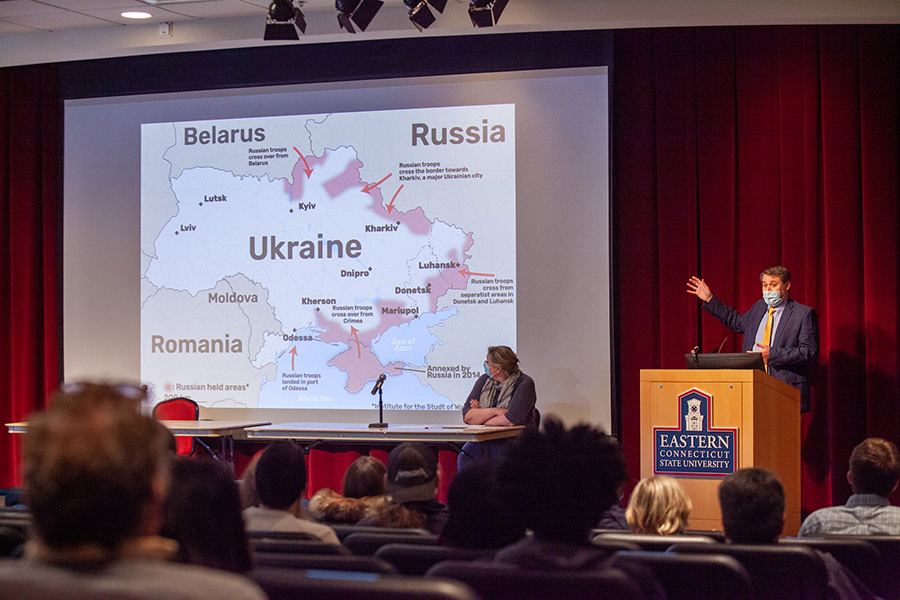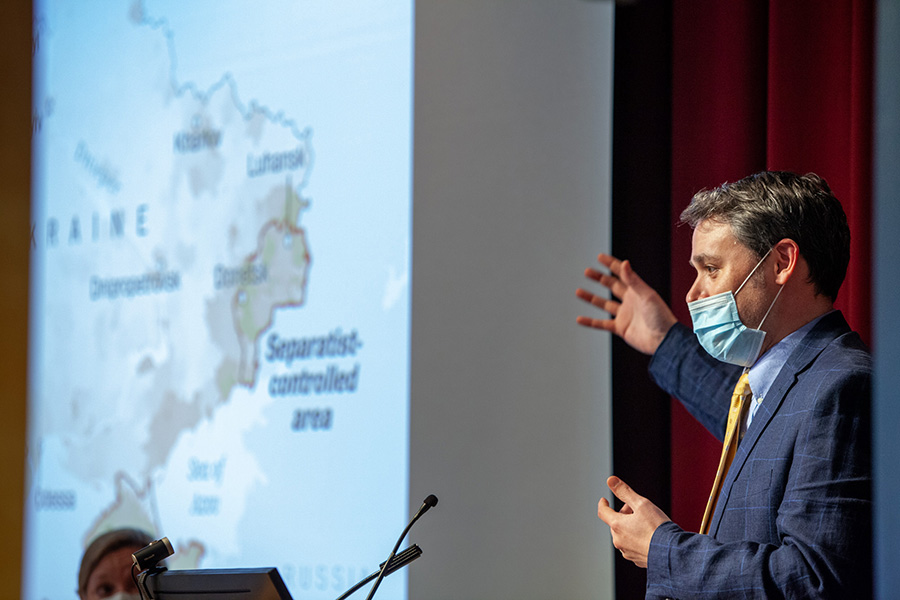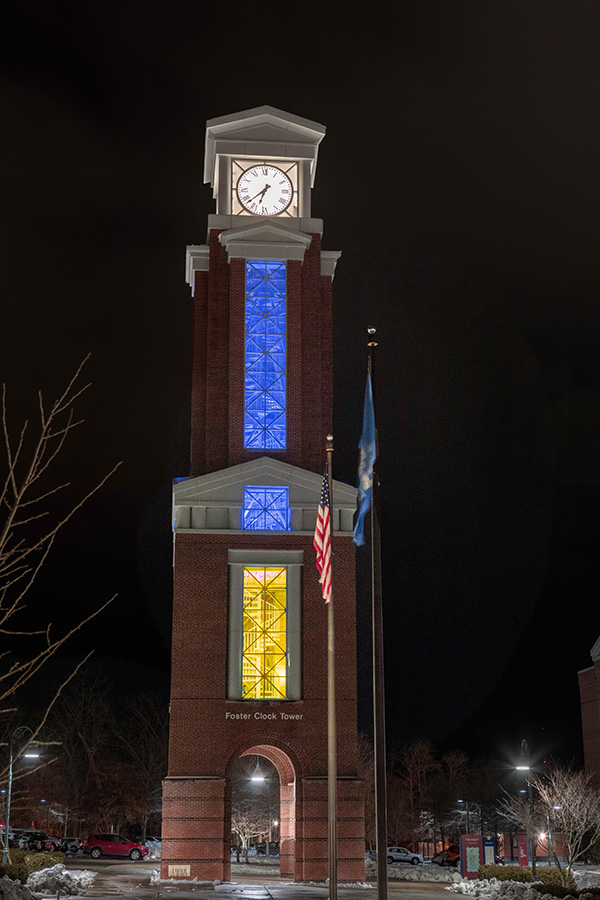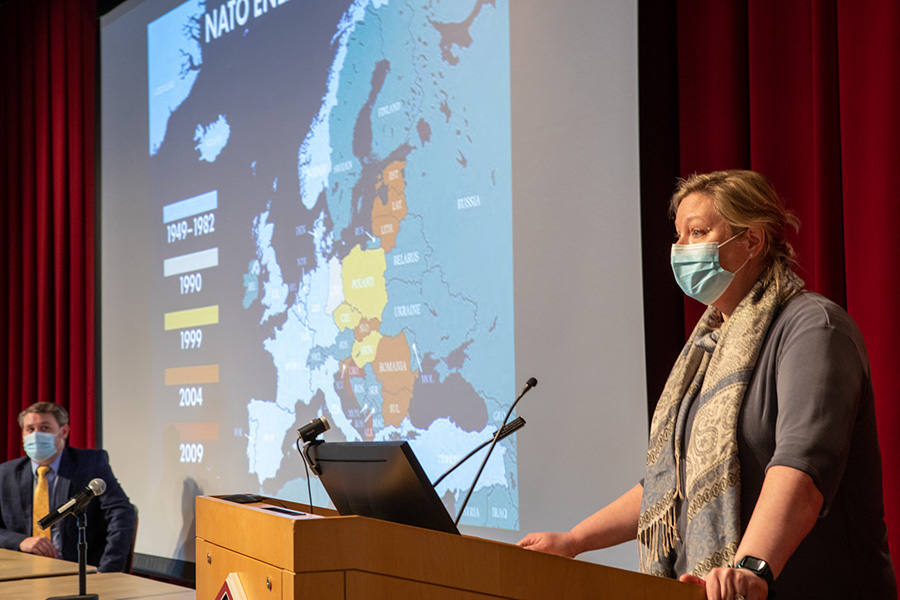- Apply
- Visit
- Request Info
- Give
Understanding the war in Ukraine
Professors Moore and Carenen lend historical perspective
Written by Michael Rouleau
Published on March 03, 2022

Two faculty members from the Department of History at Eastern Connecticut State University provided historical context on the war in Ukraine in a flash talk presentation on March 2. Professor Scott Moore specializes in European history and Professor Caitlin Carenen specializes in American foreign policy —two areas directly connected to the developing conflict between Russia and Ukraine.
Russian military forces invaded Ukraine on Feb. 24, according to Moore, under the false pretext of genocide against Russian Ukrainians and after Russian President Vladimir Putin recognized the independence of Russian-separatist regions within the eastern borders of Ukraine.
The conflict has since escalated to a full-scale invasion of the sovereign nation. “The future of the conflict is dangerous and unpredictable, unlike anything we’ve seen since World War II,” said Moore. While this might seem like a far-off conflict in a troubled region, Moore says this attack on one of the world’s newest democracies has global repercussions.
Putin and the Soviet Union

To better understand the intentions of Putin, Moore gave a brief history lesson of the breakup of the Soviet Union. Putin was a KGB officer in 1989 when the Berlin Wall fell, signaling a new, pro-democratic era for Europe.
A traditional authoritarian, Putin looked on with fury as former Soviet territory began to sympathize with the West. The Soviet Union ultimately collapsed in 1991 and dozens of countries gained independence and started to form democratic governments.
“Putin believed the breakup of the Soviet Union to be the greatest catastrophe of the 20th century… the fall of a global empire,” said Moore, adding that Putin comes from a line of thinking that favors authoritarian leadership. “He is deeply distrustful of the power of people to control their own destinies.”
According to Moore, Putin became acting president of Russia in 1999, and began overseeing a “managed democracy” while covertly putting power into the hands of a loyal oligarchy, a small group of wealthy elites, and subverting democratic institutions in Russia.

“He came to power promising to be a reformer and to end corruption,” said Moore. “In reality he (wanted) to end Russia’s democratic systems and ushered in a new set of oligarchs who are deeply loyal to him.”
Putin has served as president of Russia for almost 18 years, first from 2000–2008 and then since 2012. According to Moore, Putin’s government has gained control of the country’s media and educational system, and has been known to meddle in international elections while rigging its own elections and engaging in misinformation campaigns.
Moore says that Putin has been angered throughout his presidency by the pro-democratic expansion of the European Union as well as NATO — the North Atlantic Treaty Organization — which now consists of 30 allied nations who promise to defend each other in times of war. “He sees this as a deep intrusion from the West on Russian/Soviet territory.”
Putin has been utilizing military and cyber tactics, according to Moore, to support authoritarian regimes, influence elections and incrementally gain back the influence Russia lost with the collapse of the Soviet Union.
“Hungary has transitioned into a quasi-authoritarian regime over the past 10 years,” said Moore, adding that Belarus is very much under Russian influence and reminding us that this current attack on Ukraine is preceded by the 2014 invasion of Crimea, a southeastern separatist region now under control of Russia.
Far from a military threat, Moore says that Ukraine is an ideological threat to Putin. “He cannot allow a strong democratic society to develop in territory he considers to be part of Russia’s sphere of influence.”
American Foreign Policy
Professor Carenen followed Moore with a presentation on American foreign policy. "Isolationism — staying out of other’s business; not getting involved — was a powerful thread in U.S. foreign policy for years,” said Carenen. “This was a big lesson for us after World War I. But World War II shattered the notion of being isolated; we no longer had the geographic protection of oceans.”

Carenen says the United States was forced to reconsider its relationship with the world and figure out a way to deal with the globe’s other post-WWII superpower: the Soviet Union. American foreign policy shifted from isolationism to the “containment of Soviet expansionist tendencies.”
NATO formed in 1949, shortly after WWII. The original 12 countries asked to become members, according to Carenen, as a way to stave off communist expansion. With the current attack on Ukraine, she said that nearby Sweden and Finland are escalating debates about joining NATO, to which Putin has threatened a military response.
“Ukraine is a new democracy that has clearly turned away from Russia and to the West, and it’s now threatened,” said Carenen. Should Russia succeed in taking Ukraine, Carenen is concerned that Putin’s expansion will not stop there. Following Nazi Germany’s occupation of Czechoslovakia in 1938, she noted that Hitler’s unexpected invasion of Poland is what ignited WWII.
“If the conflict extends into NATO territory, the United States will become involved,” said Carenen, adding that things could escalate quickly with two nuclear superpowers at war.
During this disturbing time, Carenen encouraged the audience to have faith in the Ukrainian people and in democracy: “Democracy dies on apathy.” She also warned that supply chain issues and inflation are likely to get worse as Europe is locked in war and sanctions.


